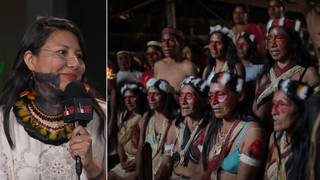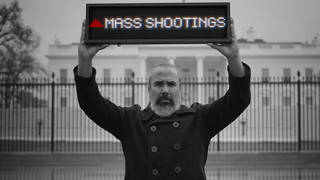
Guests
- Mona Hanna-Attishapediatrician based in Flint, Michigan, a professor of medicine at Michigan State University and director of the Pediatric Public Health Initiative.
- Robert Schentrupgun violence prevention advocate whose sister, Carmen, was killed in the 2018 mass shooting at Marjory Stoneman Douglas High School in Parkland, Florida.
The Michigan State University community is in mourning after a mass shooting on campus Monday in which a gunman killed three students and severely wounded five more. In response to Monday’s killings, both Michigan Governor Gretchen Whitmer and President Joe Biden have called for tighter gun laws to restrict the purchase of weapons. Monday’s bloodshed came just a day before the fifth anniversary of the 2018 mass shooting at Marjory Stoneman Douglas High School in Parkland, Florida, highlighting the ever-present risk of gun violence in the lives of young people in the United States. “Young people now experience gun violence multiple times throughout our lives,” says gun violence prevention advocate Robert Schentrup, whose sister Carmen was killed in the 2018 Parkland massacre. We also speak with pediatrician Dr. Mona Hanna-Attisha, who teaches at Michigan State and says gun violence must be seen as a public health crisis. “The number one killer of children is guns,” says Dr. Hanna-Attisha.
Transcript
AMY GOODMAN: This is Democracy Now!, democracynow.org, The War and Peace Report. I’m Amy Goodman, with Juan González.
The Michigan State University community is grieving after Monday night’s mass shooting on campus, a gunman killing three students, severely wounding five more. The names of the slain MSU students have been released: Arielle Anderson, Alexandria Verner and Brian Fraser. According to the Gun Violence Archive, this was the 67th mass shooting in the United States this year — on average, more than one mass shooting a day in this country since the beginning of January.
This comes as Democratic Michigan Governor Gretchen Whitmer and Democratic state lawmakers responded to the MSU mass shooting by calling for more gun control laws. President Biden also called for more gun control, calling for an assault weapons ban, as he mourned those killed at MSU and marked the fifth anniversary of the 2018 Parkland high school massacre in which 17 people were killed on Valentine’s Day.
For more, we go to Detroit, where we’re joined by Dr. Mona Hanna-Attisha, Michigan State University College of Human Medicine professor and director of Pediatric Public Health Initiative. She is a Flint-based pediatrician, also the author of What the Eyes Don’t See: A Story of Crisis, Resistance, and Hope in an American City. And with us in Washington, D.C., Robert Schentrup. His sister Carmen was killed in the Parkland mass shooting five years ago this week. He’s a gun violence prevention advocate, co-founder of the Brady youth initiative Team ENOUGH.
We welcome you both to Democracy Now! Dr. Mona, let’s begin with you. This is your university. You have your governor, Whitmer, saying this is a uniquely American problem. Talk about the fallout and what you’re calling for.
DR. MONA HANNA-ATTISHA: Yeah, this is — you know, happened in our backyard. And I think we hear about this every day in the news, and we don’t expect it to happen where we work, where we live, where we go to school. And it’s increasingly happening.
Eight p.m., I got a text, a phone call, an email, like so many other Michigan State University faculty and students and staff, that said, “Run. Hide. Fight.” And to get a message like that is surreal. This is not how we should be raising our children. This is not how we protect our children.
There’s so much that we can do. There’s so many great gun control legislation that we need to put into place. Despite this tragedy, there are glimmers of hope. Michigan is now ungerrymandered. We have — the Democrats have control of the state Legislature for the first time in 40 years. And I think we will see gun control legislation. It is not enough, but it is an important start.
JUAN GONZÁLEZ: Dr. Mona, could you talk about why gun violence is now such a public health crisis, especially with children —
DR. MONA HANNA-ATTISHA: Yeah.
JUAN GONZÁLEZ: — and what steps can be taken to prevent this kind of violence?
DR. MONA HANNA-ATTISHA: Yeah, so, the number one killer of children is guns. It exceeds motor vehicle accidents. It exceeds cancer. It exceeds anything I treat in my clinic. The number one killer of children is guns. We have more guns than we have people in this country. And it is impacting our children in so many ways. Any mass shooting triggers trauma for our children. I have two little kids. And when they have drills, they come home on edge. You know, it is a community-level trauma.
But we have to treat it like a public health crisis that it is, and we have to put into place the evidence-based tools to prevent these crises. We know what we can do. We can limit the use of them, the purchase of them. There’s background checks and red flag laws. And there’s things that we do every day as clinicians, too, in terms of injury prevention, that can also limit access. But we cannot do this alone. We need policies. We need child safety policies. We need, you know, assault weapon bans. We need more policy tools to protect children to address this epidemic of gun violence — once again, the number one killer of children.
AMY GOODMAN: I want to bring Robert Schentrup into this conversation, his sister Carmen killed in Parkland at the high school five years ago on Valentine’s Day, yesterday. You’re now with the Brady youth initiative Team ENOUGH. And each time a mass shooting happens, which is so frequent, Robert, I think about what all of you go through, those who have lived through, those who have been injured in the past massacres, like your sister, who was killed. If you can respond to what took place this week, and what you’re doing right now, how the logjam will be broken around gun control? I mean, there are people, for example, who are mentally ill all over the world. And it’s not just mentally ill people. We’re talking about a whole group of people who are angry. They are overwhelmingly almost all men. But they don’t have automatic weapons or pistols. Instead of punching someone, they can kill 17 people in one fell swoop.
ROBERT SCHENTRUP: Yeah. Well, thank you for having me on.
And as you mentioned, I mean, the events of this week are really just emblematic of the epidemic of gun violence that we just heard about. You know, from my personal experience, growing up in Parkland, going to Marjory Stoneman Douglas High School, having my two sisters go there, and then having my sister Carmen killed in the Parkland shooting, my story is an all-too-familiar American tragedy. And we’ve seen, in the five years since Parkland, which we commemorated last evening here in the District — we really wanted to highlight, you know, the types of gun violence that happen every single day.
Over 110 people are shot and killed every day here in America. And that number is only going up in recent memory. And so, you know, the incidents, like Parkland, like the tragedy that happened at Michigan State a couple of days ago, like the tragedy that happened at Northern Illinois University over 15 years ago on February 14, these are things that continue to happen. And young people bear the brunt of this issue. As we just heard from the doctor earlier, young people, the leading cause of death now, for the first time, is gun violence. It is the most likely way that we are to die. And this is something that is an issue that we have done nothing about for decades, up until the Bipartisan Safer Communities Act this year at the federal level. And it’s an issue that just keeps compounding and getting worse for that reason.
And I really want to highlight the story of a survivor from the Michigan State University shooting who was also a survivor of Sandy Hook. Young people now experience gun violence multiple times throughout our lives. And this is something that is pervasive, that we cannot — it feels like we cannot escape. And yet, it’s also something that is so common, these stories are only going to continue to happen — unless we do something.
And so, to the point of your question about how do we break this logjam, I mean, we just saw this summer, for the first time in nearly 30 years, federal legislation pass to reduce gun violence. And that’s really important. I mean, up until pretty much when it happened, a lot of the conversation was, “Oh, this is horrible. What are we going to do?” And the consensus was that change at the federal level was something that should happen but probably wasn’t going to. And then we saw, within a couple of weeks, that change.
And the reason that it changed was that there was public pressure. There were people being outspoken. And there was a push to hold politicians accountable, because we know this issue of gun violence is preventable. We see other countries, all of our other peer nations, do not have this problem. It is only the U.S., in which we have very easy access to firearms and an oversaturation of them in our communities, where we really see this issue persist, and get worse.
AMY GOODMAN: Robert Schentrup, we have five seconds. Do you think the answer is an assault weapons ban?
ROBERT SCHENTRUP: We do. And at Brady United, we support an assault weapons ban, universal background checks and a slate of comprehensive solutions, all part of our Brady Blueprint to prevent gun violence, that you can read at BradyUnited.org.
AMY GOODMAN: We thank you so much for being with us, Robert Schentrup of Brady youth initiative Team ENOUGH, and Dr. Mona Hanna-Attisha. I’m Amy Goodman, with Juan González.












Media Options